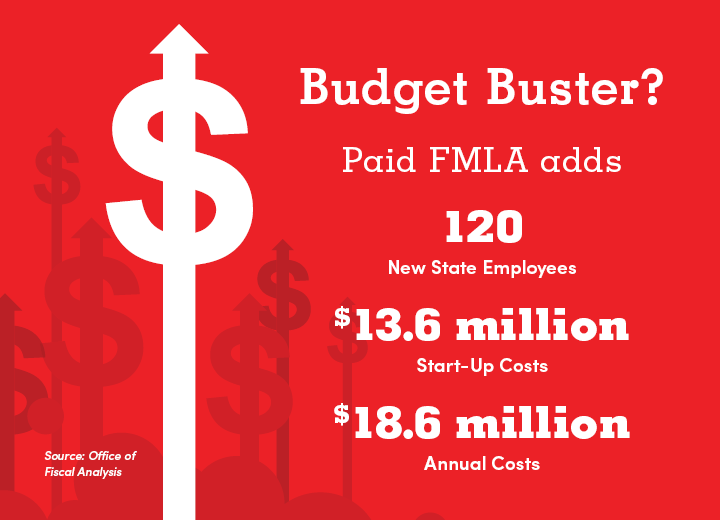Paid FMLA Adds 120 State Employees, Tens of Millions to Budget

Despite a looming $3.6 billion budget deficit, some lawmakers support a bill that costs taxpayers tens of millions of dollars annually while adding at least 120 new state employees.
SB 1 and HB 6212 impose a paid family and medical leave mandate that applies to all Connecticut businesses with two or more workers.

Workers are then entitled to up to 12 weeks of paid leave each year at 100% of their pay—capped at $1,000 per week—for their own or a family member’s illness.
CBIA already noted that a much higher percentage of employees’ pay than originally discussed will be taken to keep the fund solvent, and that paying out the full FMLA benefit to one worker will require the contributions of 47 workers.
$13M Start-Up, $18M Annual Costs
The program also costs taxpayers about $13.6 million to start, and another $18.6 million in annual recurring costs.
The $18.6 million goes to hiring 120 new state employees needed to run the program, although some estimates say as many as 180 new workers will be needed.
The Malloy administration is currently negotiating over $1.5 billion in concessions with state employee unions to help balance the 2018-2019 budget and avoid layoffs.
While many lawmakers wrestle with controlling state spending, a small group of advocates want to increase the burden on taxpayers.
So while many lawmakers wrestle with controlling state spending, a small group of advocates want your employees to pick up the tab for hiring more state employees.
Ironically, the state exempted itself from this proposal, which currently applies only to the private sector.
Mandates like paid FMLA weaken Connecticut's economic competitiveness—regionally, nationally, and globally—discouraging sorely needed investment in the state while hampering job creation.
Despite strong first quarter job growth, Connecticut has recovered just 77% of all jobs lost during the recession—sixth slowest in the country—and is the only state in the region yet to reach full recovery.
Instead of mandates that impose additional burdens on taxpayers and further stall economic growth, lawmakers must focus on improving Connecticut's competitive position.
For more information, contact CBIA’s Eric Gjede (860.480.1784) | @egjede
RELATED
EXPLORE BY CATEGORY
Stay Connected with CBIA News Digests
The latest news and information delivered directly to your inbox.


